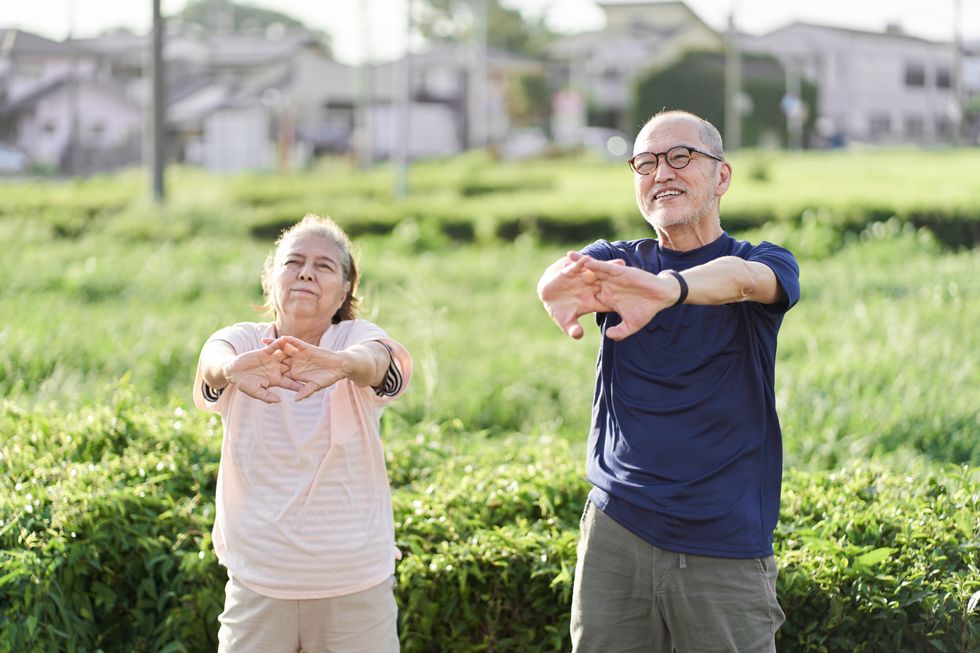Looking to turn back the clock? Breakthrough study finds 8 lifestyle habits may REVERSE ageing

Heart-healthy lifestyle habits may reverse ageing, finds new study
|Getty Images

- Heart-healthy habits may reverse ageing, finds new study
- The habits also lower risk of heart disease, stroke and death
Don't Miss
Most Read
Adopting heart-healthy habits such as eating well, exercising regularly and getting enough sleep may reverse biological ageing (the age of the body and its cells), new research suggests.
The lifestyle habits were also found to slash the risk of heart disease, stroke and death.
“Our study findings tell us that no matter what your actual age is, better heart-healthy behaviors and managing heart disease risk factors were associated with a younger biological age and a lower risk of heart disease and stroke, death from heart disease and stroke and death from any cause,” said Jiantao Ma, Ph.D., senior study author and an assistant professor in the division of nutrition epidemiology and data science at the Friedman School of Nutrition Science and Policy at Tufts University in Boston.
The study suggested the following habits produce these desirable effects:
- Eat Better - Aim for an overall healthy eating pattern that includes whole foods, lots of fruits and vegetables, lean protein, nuts, seeds, and cooking in non-tropical oils such as olive and canola.
- Be More Active - Adults should get two percent hours of moderate or 75 minutes of vigorous physical activity per week. Kids should have 60 minutes every day, including play and structured activities.
- Quit Tobacco - Use of inhaled nicotine delivery products, which includes traditional cigarettes, e-cigarettes and vaping.
- Get Healthy Sleep - Most adults need seven to nine hours of sleep each night. Children require more: ten to 16 hours for ages five and younger, including naps; nine to 12 hours for ages six to 12; and eight to 10 hours for ages thirteen to eighteen. Adequate sleep promotes healing, improves brain function and reduces the risk for chronic diseases.
- Manage Weight - Achieving and maintaining a healthy weight has many benefits. Body mass index, a numerical value of your weight in relation to your height, is a useful gauge. Optimal BMI is less than 25, but less than 18.5 is considered underweight. You can calculate it online or consult a health care professional.
- Control Cholesterol - High levels of non-HDL, or “bad” cholesterol can lead to heart disease. Your health care professional can consider non-HDL cholesterol as the preferred number to monitor, rather than total cholesterol, because it can be measured without fasting beforehand and is reliably calculated among all people.
- Manage Blood Sugar - Most of the food we eat is turned into glucose (or blood sugar) that our bodies use as energy. Over time, high levels of blood sugar can damage your heart, kidneys, eyes and nerves. As part of testing, monitoring hemoglobin A1c can better reflect long-term control in people with diabetes or prediabetes.
- Manage Blood Pressure - Keeping your blood pressure within acceptable ranges can keep you healthier longer. Levels less than 120/80 mm Hg are optimal. High blood pressure is defined as 130-139 mm Hg systolic pressure (the top number in a reading) or 80-89 mm Hg diastolic pressure (bottom number).

Keeping your blood pressure within acceptable ranges was among the habits singled out
|Getty Images
The habits are collectively known as 'Life’s Essential 8': key measures for improving and maintaining cardiovascular health, as defined by the American Heart Association.
How did the researchers gather their findings?
This study analysed whether a chemical modification process known as DNA methylation, which regulates gene expression, may be one mechanism by which cardiovascular disease health factors affect cell ageing and the risk of death.
DNA methylation levels are the most promising biomarker to estimate biological age. To some degree, biological age is determined by your genetic makeup, and it can also be influenced by lifestyle factors and stress.
Researchers examined health data for 5,682 adults (mean age of 56 years; 56 percent of participants were women) who were enrolled in the Framingham Heart Study, an ongoing, large, multigenerational research project aimed at identifying risk factors for heart disease. Using interviews, physical exams and laboratory tests, all participants were assessed using the American Heart Association’s Life’s Essential 8 tool.
The tool scores cardiovascular health between nought to 100 (with 100 being the best) using a composite of four behavioral measures (dietary intake, physical activity, hours slept per night and smoking status) and four clinical measurements (body mass index, cholesterol, blood sugar and blood pressure).
Each participant was also assessed using four tools that estimate biological age based on DNA methylation and a fifth tool that assesses a person’s genetic tendency towards accelerated biological aging. Participants were followed for 11-14 years for new-onset cardiovascular disease, cardiovascular death or death from any cause.
The analysis found:
- For each 13-point increase in an individual’s Life’s Essential 8 score, the risk of developing cardiovascular disease for the first time was reduced by about 35 percent, death from cardiovascular disease was reduced by 36% and death from any cause was reduced by 29 percent.
- In participants with a genetic risk profile making them more likely to have an accelerated biological age, the Life’s Essential 8 score had a larger impact on outcomes potentially via DNA methylation, i.e., DNA methylation accounted for 39 percent, 39 percent, and 78 percent reduction in the risk of cardiovascular disease , cardiovascular death and all-cause death, respectively.
- Overall, about 20 percent of the association between Life’s Essential 8 scores and cardiovascular outcomes was estimated to be due to the impact of cardiovascular health factors on DNA methylation; in contrast, for participants at higher genetic risk, the association was almost 40 percent.
“While there are a few DNA methylation-based, biological age calculators commercially available, we don’t have a good recommendation regarding whether people need to know their epigenetic age,” Ma said. “Our message is that everyone should be mindful of the eight heart disease and stroke health factors: eat healthy foods; be more active; quit tobacco; get healthy sleep; manage weight; and maintain healthy cholesterol, blood sugar and blood pressure levels.”
Randi Foraker, Ph.D., M.A., FAHA, co-author of the Life’s Essential 8: Updating and Enhancing the American Heart Association’s Construct of Cardiovascular Health, says the findings are consistent with prior research.
“We know that modifiable risk factors and DNA methylation are independently associated with cardiovascular disease. What this study adds is that DNA methylation may serve as a mediator between risk factors and cardiovascular disease,” said Foraker, who is a professor of medicine at the Institute for Informatics, Data Science and Biostatistics and director of the Center for Population Health Informatics, both at Washington University School of Medicine in St. Louis, Missouri. “The study highlights how cardiovascular health can impact biological aging and has important implications for healthy ageing and prevention of cardiovascular disease and potentially other health conditions.”
LATEST DEVELOP,MENTS

Previous research suggested ticking off ' Life’s Essential 8' checklist can reduce ageing by six years
|Getty Images
Cause and effect could not be established so definitive conclusions cannot be drawn from the study.
However, it builds on previous research. A study presented at the American Heart Association’s Scientific Sessions last year reported that having high cardiovascular health as defined by adherence to the AHA’s Life’s Essential 8 checklist may slow biological aging by an average of six years.
The researchers examined how well people followed the Life’s Essential 8 checklist to gauge cardiovascular health. The eight measures were averaged, and the score was used to place people in high, moderate, or low cardiovascular health categories.
The team also measured the biological aging process by calculating the study participants’ phenotypic age. Phenotypic age is based on chronological age plus the results of nine blood tests chosen to measure metabolism, inflammation, and organ function.
To determine each person’s phenotypic age acceleration, the difference between their chronological and phenotypic age was calculated to see if they were aging faster or slower relative to their chronological age.
For the 6,500 adults who were involved in the study, the researchers found that people with high cardiovascular health were physiologically younger than their age. On average, their chronological age was 41, yet their biological age was 36.
On the other hand, those with low cardiovascular health were found to be aging faster than expected. These individuals had an average age of 53, yet their average biological age was 57.
Additionally, having the highest Life’s Essential 8 score — meaning the person had high cardiovascular health — was linked with having a biological age that was, on average, six years younger in comparison to the people with the lowest scores.










